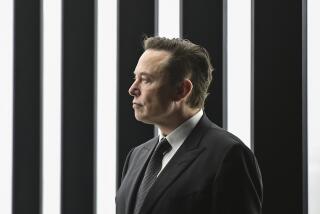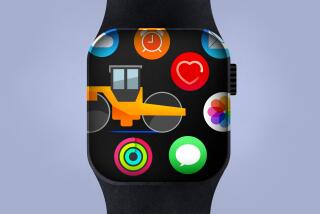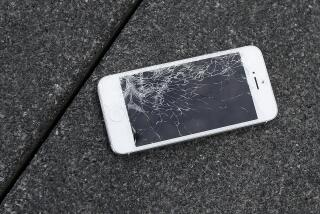Apple opposes order to help FBI unlock phone belonging to San Bernardino shooter
Apple Inc. CEO Tim Cook says his company will resist a federal judge’s order to access encrypted data hidden on a cellphone that belonged to the terrorist couple who killed 14 people in San Bernardino last year.
In a statement released early Wednesday, Cook said that such a move would undermine encryption by creating a backdoor that could potentially be used on other future devices.
“In the wrong hands, this software -- which does not exist today -- would have the potential to unlock any iPhone in someone’s physical possession,” the statement said.
See more of our top stories on Facebook >>
The judge’s order is aimed at removing what had become a barrier in the investigation of the deadliest terrorist attack on U.S. soil since 9/11.
Authorities are trying to determine the couple’s movements between the time of the attack at the Inland Regional Center the morning of Dec. 2 and their deaths in a wild firefight with police hours later. Last month, the FBI asked for the public’s help in filling in an 18-minute gap in the narrative of the couple’s whereabouts.
The FBI is also probing whether the couple received any help in plotting or carrying out the attacks.
U.S. Magistrate Judge Sheri Pym in Riverside directed Apple on Tuesday to help the FBI get around the phone’s passcode protection and any auto-erase functions the device might employ.
“The government has been unable to complete the search because it cannot access the iPhone’s encrypted content,” U.S. Atty. Eileen Decker wrote in a 40-page motion to the judge. “Apple has the exclusive technical means which would assist the government in completing its search, but has declined to provide that assistance voluntarily.”
The device, an iPhone5, was given to Syed Rizwan Farook by the San Bernardino County Health Department and was used in his job as an inspector, according to the motion.
It is the tech giant’s policy to require law enforcement to obtain search warrants or subpoenas before aiding in investigations.
But the company sees the order as an “overreach by the U.S. government,” according to the statement.
The health department gave the FBI consent to search the phone, according to the motion, but authorities have been unable to bypass the phone’s passcode lock for fear its operating system would destroy all data on the phone after 10 failed attempts.
In its motion, the FBI said Apple should be able to turn off the device’s auto-erase functions, allowing the government to submit “test passcodes” to the phone without the risk of destroying the data it seeks. The motion said that Apple routinely complies with law enforcement when presented with a search warrant or judicial order.
The phone stopped sending backup information to the iCloud server on Oct. 19, 2015, according to the government’s motion, and the FBI believes that Farook may have disabled that function in order to hide evidence. Any communications or data linked to the shooting after Oct. 19 would be accessible only through the device, according to the motion.
Farook also used the phone to talk with Malik after that date, court records show.
Investigators are hoping the data on the phone will help answer several questions that have persisted since the shooting. It remains unclear why Farook left a bag with several pipe bombs in the conference room where he and his wife opened fire, why the bombs were not detonated, or if the couple were plotting other attacks.
Enrique Marquez Jr., a friend of Farook’s, is accused of buying two rifles used in the shootings. Marquez has been arrested and charged with providing material support for terrorists and other crimes. He has pleaded not guilty.
Location data on the phone, among other pieces of information, could also help investigators answer questions about the couple’s movements during an 18-minute gap in the FBI’s timeline of their actions following the shooting.
FBI Director James B. Comey first revealed the agency’s struggles to access the phone data while speaking before the Senate Intelligence Committee last week.
Several cellphone models, including Apple’s iPhone 6 and Samsung’s Galaxy S6, use advanced encryption algorithms that scramble all the data on the device when a pin code is set.
Encrypted cellphones and text-messaging apps have made it harder for investigators and intelligence services to track suspected plots in real time, or trace locations and connections once they acquire a suspect’s device, Comey said.
Apple changed the way it manages phone encryption in September 2014, a move that makes it more difficult for law enforcement to access encrypted data on cellphones, according to Clifford Neuman, director of USC’s Center for Computer System Security. Previously, forensic investigators could tap into a device’s hardware port and gain access to a phone’s data “independent of needing to try passcodes,” he said.
“That path into the device is no longer possible,” Neuman said.
The change in the encryption method means Apple may not be able to decrypt the data, according to Neuman. The company could, however, bypass the access code system that would cause the data to be erased, and then grant the FBI access to the encrypted data. Federal investigators would then have to decrypt the data themselves, Neuman said.
The tech industry and the government have long been at odds over how much access law enforcement and national security agencies should be given to private phone data. Recently, Comey, Atty. Gen. Loretta Lynch and other national security leaders met with representatives from Google, Apple and Facebook in San Jose to try and find common ground that would help investigators gain crucial information about possible terror plots without compromising the privacy of the companies’ customers.
In the wake of the San Bernardino attack, President Obama addressed the nation, urging high-tech and law enforcement leaders “to make it harder for terrorists to use technology to escape from justice.”
Although the tech industry says it wants to help, it’s reluctant to give away private information and data to government agencies, arguing that doing so fosters user distrust and raises the risk of hacker attacks.
GOP presidential candidate Donald Trump on Wednesday said he agreed Apple should help the FBI.
“To think that Apple won’t allow us to get into her cellphone — who do they think they are?” Trump told Fox News. “No, we have to open it up.”
Staff writers Joel Rubin, Andrea Chang and Richard Winton contributed to this report.
Twitter: @JamesQueallyLAT and @ByBrianBennett
ALSO
‘Get the baby out of the toilet,’ dispatcher tells sandwich makers
Kamala Harris: ‘I do not wish to be considered’ for the Supreme Court
Grim Sleeper serial killer trial begins, years after slayings terrorized South L.A.
More to Read
Sign up for Essential California
The most important California stories and recommendations in your inbox every morning.
You may occasionally receive promotional content from the Los Angeles Times.












